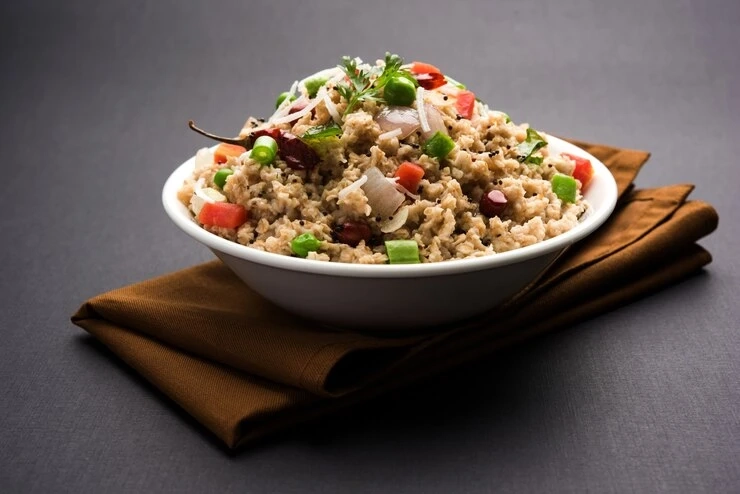Oats are among the healthiest grains on the planet. Vitamins, minerals, fibre, and antioxidants are in gluten-free whole grains. Oats (Avena sativa) are a cereal eaten as oatmeal or rolled oats.
Oats and oatmeal provide many health benefits, according to a CFTRI study. For example, they reduce weight, blood sugar, and heart disease risk. Oats may also prevent various diseases, according to a study.
Porridge, breakfast cereals, and baked foods use them most (oatcakes, oat cookies, and oat bread). Oatmeal has also become a healthy food.
Nutritional Value Of Oats
100g of oats is a superfood with
Calories- 389 kcalTotal fat- 6.9 gCarbohydrates- 66.27 gDietary fibre- 10.1 gProtein- 16.89 gCalcium- 54 mgIron- 4.72 mgPotassium- 429 mgSodium- 2 mgZinc- 3.64 mgVitamin B1- 0.460 mgVitamin B2- 0.155 mgVitamin B5- 1.120 mgVitamin B9- 32ugCholine- 40.4 milligrammesVitamin E- 0.42 mgVitamin K- 2.0 ug
Benefits Of Oats For Health
Oats may cut cholesterol and prevent heart disease and colon cancer risk.
Beneficial To Heart Health
Lifestyle medical conditions have many studies spanning a decade in 2008.
They found that oats, oat bran, and oat flour may reduce the risk of coronary heart disease.
Oats and oat-based products normalise cholesterol and low-density lipoprotein cholesterol without changing triglycerides or HDL cholesterol.
Reduces Cancer Risk
Nearly 2 million people in India and other countries were studied to see if a high-fibre diet (mostly from whole grains and cereals like oats) lowers colon cancer risk.
The study found that 10g of fibre per day reduced colon cancer risk by 10%. According to the authors, dietary fibre, especially whole grains and cereal fibre, lowers colorectal cancer risk.
Maintains Blood Pressure
A Journal of Clinical Nutrition study found that whole grains like wholemeal bread and oats maintain blood pressure and anti-hypertensive drugs.
Three meals per day reduce cardiovascular disease risk in middle-aged persons, mostly by reducing blood pressure.
Facilitates Digestion And Decreases Obesity
Oatmeal may promote weight loss. In the Journal of Nutrition's October 2014 supplement issue, a comprehensive compilation of scholarly reviews found that oats may improve satiety, food quality, and digestive, cardiovascular, and metabolic health.
Whole grains are often advised for their digestive health advantages. According to the researcher's hypothesis, the potential health benefits might include increased immune health and a reduced likelihood of obesity and other chronic diseases.
According to the supplement's epidemiological data, regular consumption of whole grains is connected with a reduced BMI (Body Measurement Index). In addition, eating oats appears to lower hunger, according to the study.
According to the study, 10 grams of fibre per day reduces cancer risk by 10%. The study's findings led the researchers to conclude that “a high intake of dietary fibre, particularly cereal fibre and whole grains, seems to lessen the risk of colorectal cancer."
Antioxidant Properties
Oats, due to their high fibre content, help keep the digestive tract moving freely, which can benefit those who suffer from constipation.
Polyphenol avenanthramides are antioxidants in oats. In addition, Nitric oxide generation by avenanthramides may reduce blood pressure. They may also relieve irritation and inflammation when used topically.
Masala Oats Recipe
Oats, veggies, and spices can be used to make Masala Oats. These oats may be made in 15 minutes with no effort. For a healthy diet, try this oats recipe.
Ingredients
Rolled oats- 1 cup Onion- 1, choppedCarrot- 1, choppedGreen beans- 10 Peas- 1/4 cup Capsicum (green pepper)- 1, chopped Red chilli powder- ½ tspTurmeric- ½ tsp Coriander powder- ½ teaspoon Garam masala powder- ¼ tsp Salt as requiredVegetable oil- 1 tsp Asafoetida- 1 pinch Green chilli- 1, choppedPreparation Technique
In a saucepan, heat the oil, then add the asafoetida, followed by the green chillies that have been diced. One minute of cooking time is necessary.Cook chopped onion until golden. Put the diced peas, carrots, beans, and capsicum into the pan. Add salt to taste and thoroughly mix.
Before adding the additional spices, such as red chilli powder, coriander powder, turmeric, and garam masala, sauté the veggies for three to four minutes in oil over medium heat. Continue cooking for two minutes while stirring regularly.
Add 2 cups of water to oats. Combine ingredients and cover with a lid. Cook oats until absorbed the water. Frequent stirring will prevent the oats from adhering to the bottom.
Once the oats have reached their desired consistency, they should be served hot.
The Dietitian Suggestion
Oats are a “superfood" that is extremely nutritious and contains a lot of fibre. Therefore, you should consume oats in various ways daily. Add veggies like capsicum, onion, broccoli, carrots, cauliflower, etc., to the oats.
The Bottom Line
For celiacs, oats are a healthy cereal substitute. They can supply dietary fibre in addition to nutrients. A nutritious diet should include oatmeal. They can be consumed for breakfast (porridge) and added to various baked dishes.
To enhance your knowledge, go to the reference link.
0


